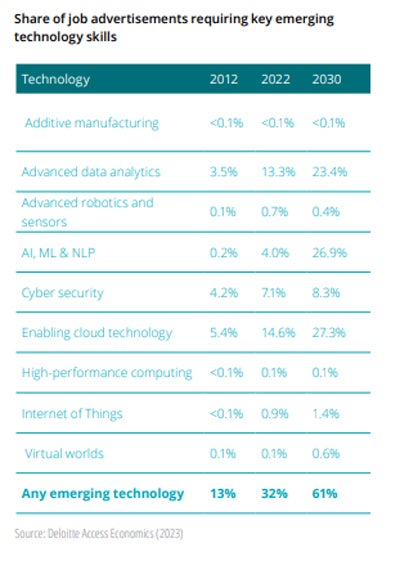- Learn with Cisco at Cisco Live 2025 in San Diego
- This Eufy robot vacuum has a built-in handheld vac - and just hit its lowest price
- I highly recommend this Lenovo laptop, and it's nearly 50% off
- Disney+ and Hulu now offer prizes, freebies, and other perks to keep you subscribed
- This new YouTube Shorts feature lets you circle to search videos more easily
Australian IT Skills Shortage: 2024 Is The Year To Self-Upskill

A recent series of reports and data point to one consistent theme: The skills crisis in the Australian IT industry is deepening and the nation-wide solutions seem unrealistic, but for IT professionals who are motivated to develop their skillsets, the opportunity is massive.
The skills crisis in Australia starts at school
A recently-released report by the Australian government titled The Australian Universities Accord contains 47 recommendations to help Australia tackle the challenges that it faces in education and subsequent workplace environments. This report speaks to an ongoing and deepening skills shortage for which a solution currently eludes the country.
The solutions proposed in the report are ambitious to the point of impracticality. For example, one of the key recommendations was for at least 80% of the working-age population to have tertiary education (it’s currently just 50%), as well as significantly boosting government support in technical areas, including R&D. This isn’t exclusive to the tech sector, but the government expects demand for experts in “Professional, Scientific and Technical Services,” including IT, to accelerate and be the second-largest source of demand for workers through 2033 (Figure A).
Figure A
In short, the government is deeply concerned about Australia’s ability to meet the demand and provide enough skilled professionals to fill critical jobs, particularly in areas such as technology.
Skilled migrants are more important than ever, but they’re under-supported
It is unlikely that domestic skills supply will be able to meet the full demand for IT professionals, even if the government takes action on the Accord’s recommendations. In acknowledging that there is a need for migrant skills to fill the gaps, late last year, the government announced a new skilled visa that covers skills in deepest demand, including IT.
As defence think tank ASPI noted in a report of its own, there are only around 7,000 Australian students graduating with an IT degree each year, while demand for IT professionals is expected to grow by 233,000 by 2033. ASPI’s recommendation is also migration to deepen skills trade with India, again highlighting the importance of fully integrating skilled migrants within the economic environment.
However, this raises challenges of its own. The Committee for Economic Development of Australia recently released a report that highlighted the need to make participation in the Australian economy more accessible to skilled migrants.
“Weaker English skills and lack of skills recognition are preventing us from making the most of migrants’ skills and experience, with discrimination likely also having an impact,” CEDA Senior Economist Andrew Barker said in the report.
“Ensuring migrants can use their skills within their first few years in Australia is crucial to addressing ongoing skill shortages across the economy.”
Incredibly, spending on training is decelerating
Meanwhile, private enterprise isn’t doing enough to address the skills challenges either. Though the skills shortage is challenging organizations to fill roles and be able to fully leverage the IT opportunity, research from RMIT suggests that spending on training is cooling.
The university found that overall mid- to large-sized organizations were expecting to increase spending on learning and development by 15% to AUD $8 billion, but nearly half (45%) of businesses admit they aren’t putting any priority on using the training budget to address skills gaps.
SEE: The Ultimate IT Career Kickstarter Bundle (TechRepublic)
The same report found that digital technologies, including AI, data science, coding and cyber security, were employers’ chief concerns with the skills shortage. A separate report from Deloitte found that only 3% of tech employers believe that IT graduates are job-ready, and three in five businesses believe their workforces have outdated digital skills.
Furthermore, while cross-skilling is increasingly essential, the Deloitte report found that three in four working hours by 2030 will be impacted by critical technologies, such as AI. Australians are also much less likely to be involved in learning new skills such as these. From the RMIT research, almost half of adults in the European Union have participated in some form of non-formal learning, but Australia’s rate is just 32%.
SEE: The 10 Best AI Courses in 2024 (TechRepublic)
As RMIT CEO Nic Cola said in the report: “Australian businesses have a strategic opportunity to evaluate workforce proficiencies and gaps, and to develop learning and development frameworks that fortify teams for the future. If businesses are to maximise their return on investment, they must get their priorities in check to develop capabilities in the areas the workforce most needs.”
The early bird gets the worm: Self-upskilling could lead to a higher salary
For IT professionals in Australia, this is an opportunity for those who take initiative. While their organizations might not be investing in upskilling and emerging technologies, those businesses need people with skills in those areas. As the Deloitte research found, job advertisements requiring key emerging technology skills will account for 61% of job postings overall by 2030.
Figure B

“It will be essential that professionals of all shapes and sizes have the right skills to effectively harness and leverage the key emerging technologies identified,” the report noted. “Without them, the full potential of digital technologies will remain untapped.”
What this means is that IT professionals will need to invest in their own skills development if their employers wont, and build capabilities in both “hard” and “soft” skills around technology. Project management will be as important as the ability to code and analyse data.
SEE: The Project Management & Scrum Certification Preparation Exams Bundle (TechRepublic Academy)
Recruitment agency Hays noted that tech professionals have become some of the highest earners in Australia, with many jobs paying over $200,000. “Whether you’re passionate about data, software development, QA testing, or aspire to a leadership position like CIO or CTO, there’s money to be made if you have the right skills and work ethic,” Hays noted. “If you’re thinking about a career change to the IT industry, now’s the time to start learning the necessary skills so you can join the ranks of the highest-paid IT professionals in Australia.”
By taking the initiative, gaining qualifications and certifications in the most in-demand skills, and being willing to move as organizations compete for those skills, IT professionals are well-placed in a market that is heavily weighted toward supporting a small domestic supply of skills to become some of the most financially successful individuals in the country in 2024 and the decade ahead.

